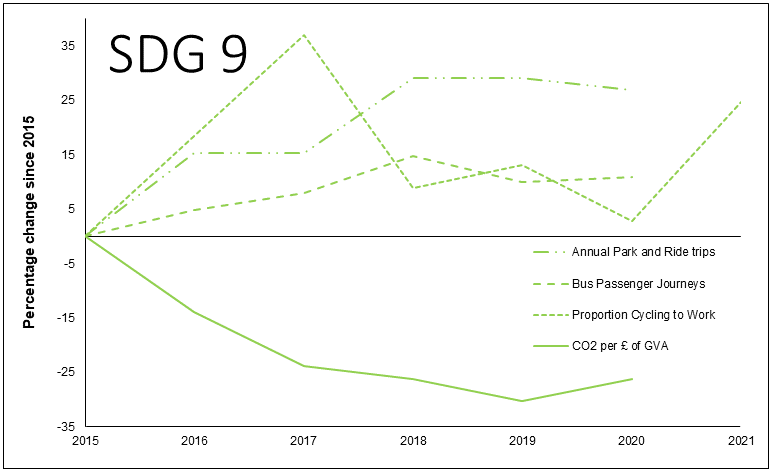SDG 9: Industry, innovation and infrastructure
What does the data show?
Manufacturing
Manufacturing Gross Value Added in Bristol increased slightly, from £457 Million in 2015 to £471 million in 2020, with a peak of £547 million in 2019. The proportion of total employment in manufacturing shows a similar pattern, rising from 3.1% in 2015 to 3.2% in 2020 with a peak of 3.42 in 2019. CO2 emissions per unit of Gross Domestic Product decreased from 0.12 Kt CO2/£ million GDP in 2015 to 0.09 in 2020.
Public transport, walking and cycling
Use of Bristol’s public transport infrastructure has increased. The annual number of park-and-ride trips rose from 1,329,386 in 2015 to 1,687,558 in 2020. In 2015, there were 36,779,218 passenger journeys on buses originating in Bristol, increasing to 40,776,023 in 2020. Data for 2021 is not available due to the pandemic restricting use of public transport. The proportion of the local population that cycles to work has increased, rising from 8.4% in 2011 to 18.2% in 2021. The proportion of the population that walks to work has risen from 19.5% in 2011 to 20.5% in 2021.
SDG 9: Industry, innovation and infrastructure
Manufacturing Gross Value Added in Bristol increased slightly between 2015 and2020, with a peaking in 2019.
The proportion of the population accessing the internet has risen alongside the availability of superfast broadband. Bus trips and park and ride trips have also been increasing, along with the proportion of people cycling and walking to work.
Internet usage
The proportion of the Bristol population that used the internet in the last three months rose from 92.8% 2018 to 94.7% in 2020. This is above the UK average of 92.1% (2020). Bristol also has higher-than-the-UK average access to gigabit-capable broadband, at 49.5% of households. However, digital exclusion is a still a significant problem across the city.
What Bristol is doing
Working with partners to provide a low-carbon infrastructure
The City Leap partnership is a new approach to providing low-carbon infrastructure for a city. Bristol City Council has partnered with Ameresco and Vattenfall to leverage over £1billion of investment in the city’s low-carbon infrastructure across 20 years. As part of this commitment, Vattenfall and Ameresco will help deliver district heat networks and retrofit the city’s social housing stock.
Refurbished laptops for children from disadvantaged backgrounds
With the increased number of people working and learning from home, the COVID-19 pandemic highlighted the importance of internet access for all. Bristol-based charity DigiLocal aims to improve the education of young people, and throughout lockdown, provided refurbished laptops to children from disadvantaged backgrounds. The charity redistributed the laptops from city organisations seeking to tackle the digital divide. Similarly, as part of their digital inclusion scheme, Bristol City Council worked in partnership with Bristol Waste to redistribute 3,000 ex-council laptops to people experiencing digital poverty.
Local economic development trends
